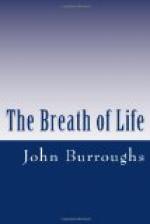IV
Bergson says the intellect is characterized by a natural inability to understand life. Certain it is, I think, that science alone cannot grasp its mystery. We must finally appeal to philosophy; we must have recourse to ideal values—to a non-scientific or super-scientific principle. We cannot live intellectually or emotionally upon science alone. Science reveals to us the relations and inter-dependence of things in the physical world and their relations to our physical well-being; philosophy reveals their relations to our mental and spiritual life, their meanings and their ideal values. Poor, indeed, is the man who has no philosophy, no commanding outlook over the tangles and contradictions of the world of sense. There is probably some unknown and unknowable factor involved in the genesis of life, but that that factor or principle does not belong to the natural, universal order is unthinkable. Yet to fail to see that what we must call intelligence pervades and is active in all organic nature is to be spiritually blind. But to see it as something foreign to or separable from nature is to do violence to our faith in the constancy and sufficiency of the natural order. One star differeth from another in glory. There are degrees of mystery in the universe. The most mystifying thing in inorganic nature is electricity,—that disembodied energy that slumbers in the ultimate particles of matter, unseen, unfelt, unknown, till it suddenly leaps forth with such terrible vividness and power on the face of the storm, or till we summon it through the transformation of some other form of energy. A still higher and more inscrutable mystery is life, that something which clothes itself in each infinitely varied and beautiful as well as unbeautiful form of matter. We can evoke electricity at will from many different sources, but we can evoke life only from other life; the biogenetic law is inviolable.




